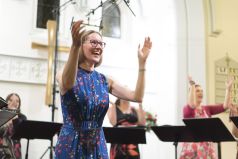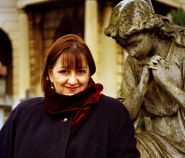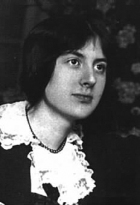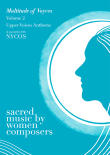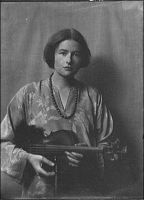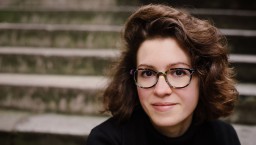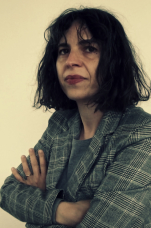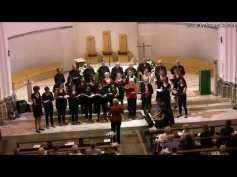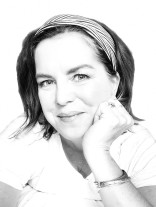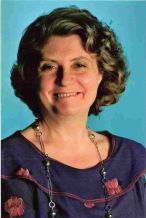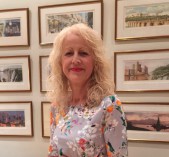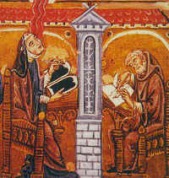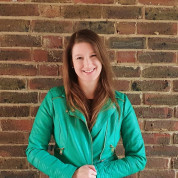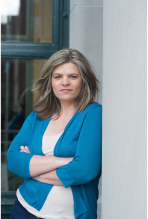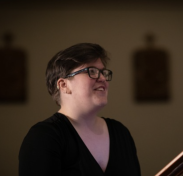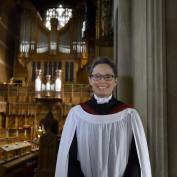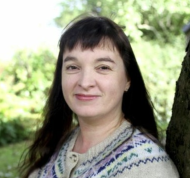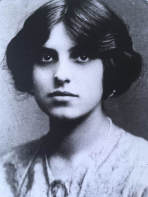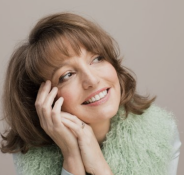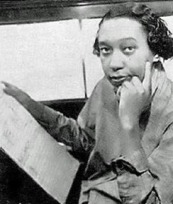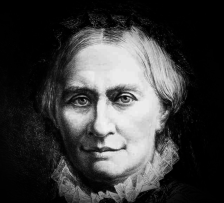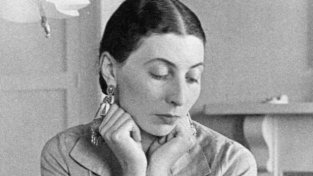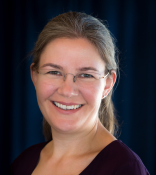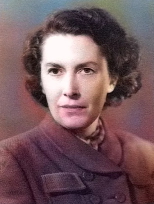Volume 2 - Composers and editors
These brief biographies are taken from Multitude of Voyces Anthology series Sacred Music by Women Composers. Unless otherwise indicated the texts are copyright of Multitude of Voyces C.I.C. and may only be utilised for educational and research purposes such as inclusion within concert programmes when music from our volumes is performed (please include appropriate acknowledgements). Please note some biographies are copyright of third parties and may not be reproduced without the express permission of those named copyright-holders. Photographs are copyright of the photographers where indicated and may not be reproduced in any form without the composers' and photographers' permission. We invite schools and other places of learning to make a small donation to our funds when making use of these resources.
Amy Bebbington (b.1975)
Amy is a passionate advocate for choral singing and choral conductor training, and sought-after for her engaging teaching style and wealth of choral pedagogical experience. She holds degrees in Piano Performance, and a Doctoral Degree in Choral Conducting. Amy is the Director of Training for the Association of British Choral Directors and a co-founder of the London International Choral Conducting Competition. She established Wavelength in 2018, an organisation created to celebrate, educate, nurture and support women in choral leadership. Amy has taught choral conducting at numerous summer schools, organisations and institutions, including her own Choral Conducting Masterclass Series. Additionally she has had choral works published by Banks Music Publications. Amy has been a juror for the LICCC, Derry International Choral Festival, BBC Choir of the Year Competition, and the Cheltenham Music Festival among others. She is in great demand as a choral clinician, mentor and teacher, and currently directs a plethora of diverse choirs.
Judith Bingham (b.1952)
Born in Nottingham and brought up in Mansfield and Sheffield, Judith Bingham began composing as a small child, and then studied composing and singing at the Royal Academy of Music in London. She was for many years in the BBC Singers before becoming their Composer in Residence. Her career has been marked by many outstanding works for the Church. In later years she has become known for her organ music, but she has also written large-scale works for orchestra, a church opera, The Ivory Tree, and a substantial canon of chamber music. Composition prizes include: the Barlow Prize for a cappella music in 2004 and four British Composer Awards in the choral, instrumental and liturgical categories. The University of Aberdeen awarded her an Honorary Doctorate in 2017.
Lili Boulanger (1893 – 1918)
Marie-Juliette Olga "Lili" Boulanger was a French composer, who became the first woman to win the Prix de Rome composition prize when she was just 19. Born in Paris in 1893, her musical talent became apparent at the age of two when Gabriel Fauré, a friend of the family, discovered she had perfect pitch. Her parents, both musicians, ensured that Lili and her older sister Nadia received a thorough musical education at the Paris Conservatoire. Lili began lessons in music theory at the age of 5 and studied the organ with Louis Vierne. She also sang, and played the violin, cello and harp. In 1913, Boulanger won the Prix de Rome composition prize for her cantata Faust et Hélène, following in the footsteps of her father Ernest Boulanger, who won the Prix de Rome in 1835. The cantata was frequently performed throughout her lifetime and its popularity led to a contract with the music publisher Ricordi. Boulanger’s short life was blighted by debilitating illness. A case of bronchial pneumonia permanently weakened her immune system and led to her contracting intestinal tuberculosis, which ended her life at the age of 24. Her death left her first opera La princesse Maleine unfinished. Nadia Boulanger, the first woman to conduct the New York Philharmonic, worked tirelessly throughout her life to promote her sister’s music and to preserve her legacy.
Hilary Campbell (b.1983)
Hilary Campbell is a freelance choral specialist, and is founder and Musical Director of professional chamber choir Blossom Street, and Musical Director of Bristol Choral Society, Chiswick Choir and the Music Makers of London. Her project work includes guest conducting ensembles including the BBC Singers, Trinity Laban Chamber Choir and the University of Greenwich Choir, and chorus mastering the BBC Symphony Chorus and Royal Academy of Music Symphony Chorus. In 2020, Hilary will be acting as Associate Conductor of Ex Cathedra. She also acts as an adjudicator, choral workshop leader and guest conductor, teaches at the Royal Academy of Music, and is a published and prize-winning composer. With Blossom Street, she has released two award-winning Naxos recordings, and recently released a third.
Rebecca Clarke (1886-1979)
Rebecca Clarke was born in Harrow, England, but spent most of her adult life in New York. She initially intended pursuing a career as a violinist, and began studing at the Royal Academy of Music in 1903 under Hans Wessley. She was withdrawn by her father in 1905 after one of her teachers, Percy Hilder Miles, proposed to her. Clarke attended the Royal College of Music from 1907-1910 where she was Charles Villiers Stanford’s only female composition student. It was Stanford who encouraged her to make the viola, not the violin, her principal study. Clarke subsequently played the viola professionally and was one of the founders of the English Ensemble, an all-female piano quartet. In 1916, Clarke emigrated to the US where she established herself as one of the leading female composers of her generation. Her piece for viola and piano, Morpheus was premiered in 1918 at a joint recital with cellist May Mukle in New York to great acclaim. However, Clarke’s obvious musical talent was often discredited because of her gender: whilst reviewers praised Morpheus, which Clarke composed under the pseudonym “Anthony Trent”, works in the same recital credited to Clarke received little attention. When in 1919 Clarke’s viola sonata tied for first place in the Chamber Music Prize for the Berkshire Festival with Ernest Bloch, reporters speculated that “Rebecca Clarke” was in fact a pseudonym for Bloch. Bloch was later declared the winner. Despite this prejudice, the viola sonata that Clarke had submitted was well-received when it premiered at the Berkshire music festival later that year. In 1923, the festival’s founder, Elizabeth Sprague Coolidge, commissioned a rhapsody for cello and piano from Clarke, making her the only female recipient of Coolidge’s patronage. Sadly, of the 100 works Clarke composed, only 20 were published during her lifetime and were all out of print by the time of her death.
Ninfea Cruttwell-Reade (b.1989)
Ninfea Cruttwell-Reade is composer and cellist currently based in Edinburgh. Growing up in a family of puppeteers, she has always been fascinated by intersections between music, language, movement, and the visual arts. Over the last five years she has collaborated with a range of artists on the East Coast of the United States while pursuing doctoral studies at Princeton University. Composing for old, new, and damaged musical instruments, her past projects have included works for flower pots, electric guitar, viols and theorbo, the Trinidadian steel pan, string and percussion quartets, a homemade glass harmonica, and a fire-damaged piano. She is currently writing music for a youth opera production at Glyndebourne, where she is a composer-in-residence; Ninfea is also a recipient of the Psappha Ensemble’s Peter Maxwell Davies Commission, through which I am writing a work for chamber ensemble and sitar.
Photo copyright Kate Haag
Carlotta Ferrari (b. 1975)
Italian composer Carlotta Ferrari is adjunct professor of music composition at the European School of Economics in Florence. Educated at the Conservatory in Milan, she has composed in many genres, establishing a personal language that is concerned with the blend of past and present. In collaboration with American composer Carson Cooman, she has contributed to the development of a new modal harmony system, which can be heard used to great effect in her recent compositions for organ. She has won awards for her choral works and features on several CD recordings, notably, Women of History: Music for Organ by Carlotta Ferrari.
Angelina Figus (b. 1957)
Angelina Figus is an Italian musician and lives in Sardinia. She initially studied classical guitar, composition and conducting and in 1990 went on to study lute and basso continuo under the tuition of Maestro Jorge Fresno at the Neuchâtel Conservatoire (Switzerland).
She has taught extensively in primary schools, promoting the establishment of several school choirs for which she has composed and published a wide repertoire of pieces.
She supports numerous initiatives for the promotion of the Sardinian language in music and is much in demand with poets and theatre companies in Sardinia. Her substantial musical output consists mostly of pieces for amateur choirs, which she greatly admires for both their educational and social value. She has personally founded a number of choirs within various voluntary organisations.
She currently conducts four choirs, all regularly heard in concert.
Joanna Forbes L’Estrange (b.1971)
is an international singer, songwriter, choral composer and choral leader based in London. Having graduated in Music from Oxford University, she began composing and arranging as soprano/Musical Director of the five-time Grammy® Award-winning a cappella group The Swingles. Described as ‘melodious, uplifting and accessible’, her compositions are influenced by close harmony vocal groups and jazz. Her sacred repertoire includes anthems, carols and settings of the Mass, Preces & Responses and Magnificat & Nunc Dimittis. She receives commissions for original songs from groups including The King’s Singers, The Military Wives Choirs, Finchley Children’s Music Group and the National Youth Choirs of Great Britain who made a film of her acclaimed song A woman (wearing bloomers) on a wheel. Joanna has established a fine reputation composing songs about women and gender equality and her charity single Twenty-first-century Woman raises money for girls’ education.
Bianca Maria Furgeri (b.1935)
Appointed Head of harmony and counterpoint in 1969 at Bologna Conservatoire, Bianca Maria Furgeri was previously director Rovigo Conservatoire. She has won several national and international composition competitions, as well as other prizes awarded by cities including Arezzo and Rome (including the “Benedetto XVI” Competition 2013 with an Ave Maria for mixed choir). She composes much on commission, and is a prominent figure in the solo, chamber music and choral repertoire of Italy. The Women In Music Foundation (Rome) chose one of her works (Rosa Rorans) for performance in San Pietro, to conclude the festivities of Saint Bridget of Sweden (2002) and also commissioned another two choral works (Introitus and Agnus Dei) which were then performed in a collaborative Mass set by multiple composers, dedicated to Pope Francis. Her works are published by Rugginenti, Carrara, Ricordi, Choris-Mundi and EurArte, which also sells some of her pieces on CD. A new CD of her sacred choral works has recently been released thanks to the Bank of Monte di Rovigo Foundation. The musicologist Renzo Cresti has published a paper on her musical language and numerous conservatoires and academies have held concerts of her music.
Margie Harrison (b.1955)
Margie Harrison is a pianist, flautist, choral conductor, composer and music teacher. For many years she was Head of Music and Director of Creative Arts at a large Secondary School in the UK. She is also an Examiner for A Level and GCSE Music. Margie has composed a number of sacred works, including a Mass.
Hildegard von Bingen (1098-1179)
Hildegard von gen was born in Bermersheim, Germany; she was the tenth child of Hildebert, a lesser noble in service to the count of Sponheim, and his wife, Mechtild. As was customary for younger children in the period, Hildegard was promised to the Church and when she was eight years old she was sent to the Benedictine monastery of Disibodenberg and placed under the jurisdiction of the magistra (spiritual teacher), Jutta of Sponheim. In addition to supervising her devotions, Jutta instructed Hildegard in the Psalter and taught her to read and write Latin. When Jutta died in 1136, Hildegard was appointed magistra. In 1141 she experienced Visions following which she wrote and composed her Symphonia armonie celestium revelationum - a collection of 77 chants with melody - and a music drama, Ordo Virtutum, a morality play considered to be the first such play set to music by an identifiable composer. Through the authority imparted to her through her Visions, Hildegard also taught widely and maintained complex theological correspondence with senior figures of Church and State, many of whom respected her as an inspired visionary. Whilst the exact composition dates of her works remain unclear, it has been assumed that the majority were written down between 1140-1160. She founded convents in Rupertsberg and Eibingen and died at the great age of 81, at Rupertsberg. (with thanks to International Society of Hildegard von Bingen Studies)
Carol J Jones (b. 1993)
Carol J Jones is a composer of orchestral, chamber and choral music based in the UK. Originally a dancer, she is studying for a DPhil in Music at University of Oxford under Robert Saxton having previously studied at Cardiff University for a BMus in Music and MMusic in Composition. She has worked with ensembles and artists including the BBC National Orchestra of Wales, London Contemporary Orchestra, Oxford Philharmonic Orchestra, Heath Quartet, Worcester College Chapel Choir, Scholar Cantorum, Psappha, Joby Burgess, Fenella Humphreys and Claire McCaldin, in venues across the UK. Her music has been performed at festivals including Dartington International Summer School, Cheltenham Music Festival, St Magnus International Music Festival, London Festival of Contemporary Church Music, Vale of Glamorgan Festival, and has been broadcast on BBC Radio 3.
Linda Kachelmeier (b. 1965)
Linda is a composer, conductor, and professional singer with a special passion for choral music and art song for their capacity for conveying emotion through the human voice. She has received numerous grants and commissions including the 2017 McKnight Fellowship for Composition. Linda’s music has been performed by ensembles of every level across the United States. She is the founder and artistic director of the women’s vocal ensemble LUMINA. Since 1991 she has been the Director of Music at First Presbyterian Church in South St. Paul.
Caroline Lesemann-Elliott (b. 1996)
Caroline Lesemann-Elliott is the ensemble manager for women’s voices consort, Korrigon Consort. She recently graduated from the University of Edinburgh. She is a singer, conductor and award-winning composer. Caroline’s compositions have been performed around the UK by Christ Church Cathedral Choir, the Edinburgh Composers’ Orchestra, the Scottish Chamber Orchestra, and the New Voices Consort. She was the composer in residence at the Picture Gallery of Royal Holloway in 2019. Caroline currently conducts Wolfson College Choir, Cambridge, and is a Phd. candidate at Royal Holloway, University of London. As a musicologist, Caroline is particularly interested in sacred music by 16th and 17th Century English Catholic women and the relationship between post-Reformation English Convent music and domestic musical traditions in recusant households of the 17th Century.
Sarah MacDonald (b.1968)
Sarah MacDonald is a Canadian-born organist, conductor and composer, currently living in the UK, where she is Fellow and Director of Music at Selwyn College, Cambridge, and Director of Ely Cathedral Girls’ Choir. She has been at Selwyn since 1999 and is the first woman to have held such a post in an Oxbridge chapel. Sarah studied at Toronto’s Glenn Gould School and at Cambridge University. Her teachers were Leon Fleisher, Marek Jablonski, John Tuttle and David Sanger. She has performed across the UK, North America, the Middle East and mainland Europe, and is in demand as a conductor and teacher for international residential courses. She has made over 35 commercial recordings and has had numerous choral works published. She holds the Fellowship diploma of the RCO and writes a popular monthly column for the American Guild of Organists’ magazine, The American Organist. In 2018 MacDonald received the honorary ARSCM (Associate of the Royal School of Church Music) in recognition of her contribution to choral music.
Gemma McGregor (b. 1965)
Dr Gemma McGregor is a freelance composer, performer and curator based in Orkney, whose work crosses the boundaries of musical genres and is often multi-disciplinary. Gemma studied as a postgraduate student at the University of Aberdeen with the support of an Ogston Postgraduate Scholarship and was awarded a doctorate in 2017. Several of her compositions received performances during time at university including Dove Unfurled, by the Dunedin Consort, and The Last Bright Rinsings, by the BBC Singers. Her opera, The Locked Door, was performed at Aberdeen Sound Festival in 2015 and her opera, The Story of Magnus Erlendsson, was performed at St Magnus Festival in 2017. During 2018 and 2019, Gemma’s music received performances by Strathclyde University Chamber Choir, Nordic Viola, Illuminate and the Godolphin Vocal Ensemble. Gemma was awarded a residency at the Red House, Aldeburgh, during August 2019, in order to carry out research at the Britten archive and sketch arias for a new chamber opera. She will attend another residency there in May 2020 to complete her third opera, Confined.
Morfydd Owen (1891-1918)
Morfydd Owen was a composer, pianist and mezzo-soprano who studied at Cardiff University (1909-12) and the Royal Academy of Music (1912-17). Her major scores are Nocturne (1913) and Morfa Rhuddlan (1914) for full orchestra, the cantata Pro Patria (1915) and the Threnody for strings (1916). 250 surviving manuscripts also include choral and chamber music, songs to English, Welsh and French texts, and transcriptions and arrangements of Welsh and Russian folk tunes.
Born into a musical and religious family in Treforest, Glamorgan, Morfydd began composing at the age of six. Through Charing Cross Chapel, she met leading members of London Welsh society such as David Lloyd George and Ruth Lewis who advanced her career through concert invitations and commissions. Morfydd provided the accompaniments for Lady Lewis’ Folk-Songs Collected in Flintshire and the Vale of Clwyd (1914) and gained a University of Wales Fellowship to consider how the music of Russia, Norway and Finland might influence the development of Welsh composition, although the First World War frustrated her intention to visit St Petersburg.
Morfydd’s London circle also included D. H. Lawrence, Ezra Pound, and the Freudian psychoanalyst Ernest Jones whom she married in 1917. She died of delayed chloroform poisoning following an appendectomy that was carried out in the home of her parents-in-law at Oystermouth, Swansea: a tragic end to a pioneering career that continues to intrigue and inspire. Morfydd’s compositions had already been published by Boosey and Chappell and performed at the Proms and Wigmore Hall, and her obituaries rightly lamented ‘a refined and beautiful talent’ and ‘an incalculable loss’ to Welsh and British music. (© Dr Rhian Davies, 2020)
Roxanna Panufnik (b.1968)
Roxanna has a great love of world music – this has culminated in her “Four World Seasons” for violinist Tasmin Little, the world premiere of which was picked by BBC Radio 3 to launch their Music Nations weekend, celebrating the London Olympics; her multi-faith Warner Classics CD “Love Abide” and “Dance of Life: Tallinn Mass” for Tallinn Philharmonic, commissioned to celebrate Tallinn’s reign as European Capital of Culture.
She is especially interested in building musical bridges between faiths and her first project in this field was the violin concerto “Abraham”, commissioned for Daniel Hope, incorporating Christian, Islamic and Jewish chant to create a musical analogy for the fact that these three faiths believe in the same one God. This work was subsequently converted into an overture for the World Orchestra for Peace and premiered in Jerusalem and London under the baton of Valery Gergiev, in 2008 and at the 2014 BBC Proms. Her 2017 opera “Silver Birch”, commissioned by Garsington Opera, was met with great audience and critical acclaim.
2018, Roxanna’s 50th Birthday year, saw some exciting commissions and premieres for the BBC Last Night of the Proms and a co-commissioned oratorio “Faithful Journey – a Mass for Poland” for City of Birmingham Symphony Orchestra and National Radio Symphony Orchestra of Poland, marking Poland’s centenary as an independent state. In 2019, she will have a new commission for two conductors and two choirs, premiered by Marin Alsop and Valentina Peleggi with the Baltimore Symphony Orchestra and then the Sao Paulo Symphony Orchestra. Roxanna is currently writing an epic work for the Rundfunk Chor Berlin plus 9 other choirs from all over the world, to be premiered at the Berlin Philharmonie in May 2020.
Roxanna’s compositions are published by Peter’s Edition Ltd and recorded on many labels including Warner Classics, Signum, Chandos, and EMI Classics. (Biography copyright Peters UK)
Julia Perry (1924-79)
Perry experienced the conventional musical education available to mid-century American composers: Akron University and Westminster Choir College, Juilliard School of Music and the Berkshire Music Center (now the Tanglewood Music Center), followed by a brief spell, in 1952, studying with Nadia Boulanger in France. Accolades included winning the Boulanger Grand Prize for her Viola Sonata, Guggenheim fellowships and a National Institute of Arts and Letters Award. In addition to choral and vocal music, she wrote 12 symphonies, operas, piano concertos, and chamber pieces. Her oeuvre is particularly interesting because, whilst some of her early works do reference native black culture by drawing on the music of African-American spirituals, the majority of her output is neo-classical in style. Deceptively simple melodies belie both dissonant harmony and a complexity of rhythm that rewards attentive listening; Julia Perry is a composer who deserves to be more-frequently heard.
Clara Schumann (1819-96)
A rigorous music education, delivered by her father, paved the way for Clara Schumann to excel, both as a composer and as a renowned concert pianist. She composed about a hundred pieces, half of which were written by the age of 20, before her marriage, and all of which were written in the first half of her life. She was a highly sought-after professional musician with a career that included undertaking international tours giving piano recitals, teaching piano and composition, and editing and promoting her husband’s music. She also contributed to joint Lieder collections with her composer husband, as well as producing two collections of her own. (Olivia Sparkhall)
Elizabeth Poston (1905-1987)
Elizabeth Poston, well known for her unique carol, Jesus Christ the Apple Tree, was a prolific composer, particularly of songs, producing a dozen or so meticulously researched song-books, as well as orchestral and chamber music, choral works and two operettas (altogether at least 920 works).
Born in rural Hertfordshire, she was inspired by the sounds of the countryside, saying that songs were ‘always her first and permanent love’. Her adored home, Rooks Nest House, standing on the northern outskirts of Stevenage, in view of the Chilterns, was equally appreciated by E. M. Forster, who had spent much of his youth there. He subsequently based his novel, Howards End on the house and its Poston inhabitants. Elizabeth had the moving experience of writing the incidental music for its 1970 BBC film production, as she also did for that of his Room with a View and some 65 other BBC commissions.
She had a long association with the BBC: even as a student her compositions were broadcast; in her early 30s during World War II, she was appointed Director of Music for the European Service, transmitting coded messages in the form of precisely-timed recorded music; after the war she helped to set up the BBC Third Programme, served on the BBC Advisory Panel and broadcast as a pianist and gave talks, including two notable series on her close friend, the composer Peter Warlock, who loved fifteenth and sixteenth century texts as she did – ‘the music of the words’. (Dr John S. Alabaster author: Elizabeth Poston: Catalogue of Works with Biographical Context (Alabaster, J. S., 2018))
Olivia Sparkhall (b.1976)
Olivia Sparkhall is Head of Academic Music at Godolphin School in Salisbury, Wiltshire, where she directs the multi-award-winning Godolphin Vocal Ensemble. She is a composer and arranger primarily of choral music, notably for her choir to sing in BBC One’s Songs of Praise Choir of the Year Competitions. Her association with Multitude of Voyces, which she co-founded with Louise Stewart, has resulted in several commissions: for International Women’s Day services in 2018 (Lux) and 2019 (Faith and Hope). She has also been commissioned to compose music for Multitude of Voyces’ Makaton Mass, the first mass conceived to be integrally sung and signed. She conducts massed-children’s choir concerts for the charity Barnardo’s.
Grace Williams (1906-1977)
Grace Williams was one of the first professional Welsh composers of the 20th Century to attain significant national recognition, and many of her remarkably distinctive pieces are directly inspired by Wales and its culture.
Born in Barry, Glamorganshire, she studied music at Cardiff University (1923-1926), later studying composition at the Royal College of Music (1926-1930) with Ralph Vaughan Williams, and in Vienna with Egon Wellesz (1930-1931). She particularly enjoyed writing for orchestra, and her gift for this medium is apparent in her early overture Hen Walia (1930) and the Fantasia on Welsh Nursery Tunes (1940).
Williams worked as a successful composer and music teacher in London for many years, but returned to live and work in Barry in 1947. This homecoming sparked a new and vital phase of her creative development. Her Penillion, for orchestra, (1955), for example, is a highly original orchestral adaptation of the metrical and melodic characteristics of traditional Welsh penillion singing (an improved line over a given melody). Her expanded musical vocabulary energised other significant works for orchestra including the powerful Symphony no. 2 (1956), the Trumpet Concerto (1963) and Ballads, for orchestra (1968).
Grace became more interested in writing more choral and vocal music in her later years. Her choral suite The Dancers (1951) is a radiant example of her skill at handling the choral medium, as is the exquisite Ave Maris Stella (1973) for mixed chorus. (biography copyright Tŷ Cerdd – Music Centre Wales)

